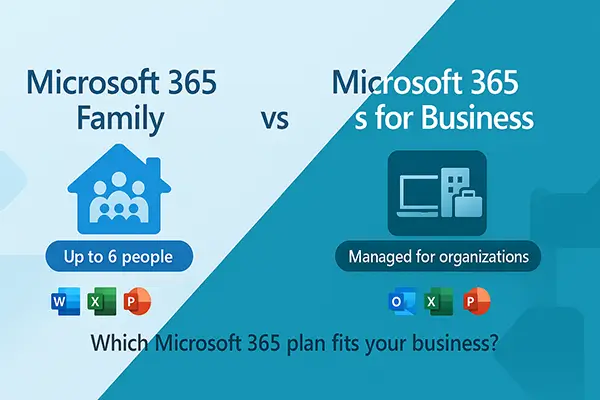Suppose your company has been running on a consumer Microsoft 365 family plan and you’ve noticed recent price changes (especially in markets like Singapore, where consumer Microsoft 365 plans bundled Copilot and adjusted pricing). In that case, this is a good moment to re-evaluate what you’re paying for — and whether Microsoft 365 Apps for business is the better fit for how you actually work.
TL;DR
- Microsoft 365 Family = great value for households (up to 6 people) with consumer features like Microsoft Designer, Clipchamp, and personal OneDrive. Not designed with centralized admin, compliance, or business services in mind.
- Microsoft 365 Apps for business = the core Microsoft 365 desktop apps (Word, Excel, PowerPoint, Outlook) plus OneDrive for Business and 24/7 support—licensed for organizations and managed in a tenant you control. No business email/Teams included (those come with Business Standard/Premium).
Quick comparison
| Area | Microsoft 365 Family | Microsoft 365 Apps for Business |
|---|---|---|
| Who it’s for | Households / personal use scenarios | Organizations that want the Office apps with business management |
| Users | 1–6 people | Per license |
| Devices per user | Up to 5 devices per person | Up to 5 PCs/Macs + 5 tablets + 5 mobiles per license |
| Cloud storage | 1 TB per person (up to 6 TB total) | 1 TB OneDrive for Business per license |
| Email (Exchange Online) | Outlook.com consumer email; not Exchange Online | Not included (add Business Standard or Exchange Online add-on) |
| Teams (work) | Not included as a managed work service | Not included (comes with Business Standard/Premium) |
| Admin & management | No organization tenant/admin center | Full Microsoft 365 admin center for license/user management |
| Compliance & controls | Consumer features | Not supported on Apps for Business (supported on Business Premium/E3/E5) |
| Shared Computer Activation (RDS/VDI) | Not applicable | Not supported on Apps for business (supported on Business Premium/E3/E5) |
| Support | Consumer support | 24/7 support from Oryon |
What you actually get
Microsoft 365 Family (consumer)
- Up to 6 users, each able to sign in on 5 devices simultaneously.
- Up to 6 TB cloud storage (1 TB per person) with ransomware recovery and Microsoft Defender (consumer).
- Consumer extras like Designer (image creation) and Clipchamp (video).
- Great for home projects, schoolwork, and personal productivity.
Microsoft 365 Apps for business (work)
- Desktop Word, Excel, PowerPoint, Outlook + web/mobile apps.
- 1 TB OneDrive for Business per user and 24/7 support.
- Managed in your Microsoft 365 tenant (work accounts), with the ability to later add Exchange Online, Teams, SharePoint, and security/compliance add-ons.
- Note: No Exchange mailbox or Teams are included in this apps-only SKU.
When should a business switch from Family to Apps for business?
- You want organizational ownership & control
Business subscriptions live in a tenant your company controls (users, licenses, data lifecycle), unlike consumer Microsoft accounts tied to individuals. - You need a clean upgrade path
Start with Microsoft 365 Apps for business now, and add Business Standard (email + Teams) or Business Premium (device management & security) later—mixing plans is supported. - You’re thinking about compliance
Even if you only need the Office apps today, being in the business ecosystem makes it much easier to adopt retention, DLP, eDiscovery, and other Microsoft Purview features later (available in higher plans). - You’ve noticed consumer plan price changes
With Microsoft 365 consumer prices shifting in some markets after Copilot bundling, aligning to a business plan can reduce ambiguity and prepare you for growth.
Microsoft 365 Migration game plan (practical & low-risk)
- Choose your landing plan
- If you only need apps + OneDrive now → Microsoft 365 Apps for business.
- If you also need email/Teams → Business Standard (you can mix with Apps).
Create or use your Microsoft 365 business tenant with Oryon
Add your company domain, create users, and assign licenses in the Microsoft 365 admin center. (Apps for business is fully managed there.)
Move files to OneDrive for Business / SharePoint
- Sign in to the OneDrive for Business client and move or sync working folders from PCs.
- For shared content, create SharePoint libraries/Teams (if you add Business Standard/Premium).
Outlook & email
- If you stay on Apps-only, Outlook works with your existing email provider (IMAP/POP/Exchange).
- If you add Exchange Online (via Business Standard/Exchange Plan), switch profiles to your new work mailbox.
Policies & lifecycle
Establish basic policies (naming, sharing defaults, MFA) and plan future security/compliance features as you scale.
Microsoft 365 FAQs
Does Microsoft 365 Apps for Business include email or Teams?
No. It’s apps + OneDrive only. Email (Exchange Online) and Teams are included with Business Standard or Business Premium.
Can we run Office on a terminal server or shared kiosk with Apps for Business?
Shared Computer Activation isn’t supported on Apps for Business. Use Business Premium or enterprise plans (E3/E5) if you need RDS/VDI scenarios.
Can we mix licenses?
Yes. You can assign different Microsoft 365 Business/Enterprise SKUs within the same tenant (e.g., some users on Apps for Business, others on Business Standard).
Bottom line
If you’re a company, moving from a consumer Microsoft 365 plan to Microsoft 365 Apps for Business puts your tools, data, and users under proper organizational management—without forcing you to buy email/Teams before you’re ready. You can start lean, keep costs focused on what you use, and scale up to Business Standard/Premium later—staying fully in the Microsoft 365 ecosystem from day one.


